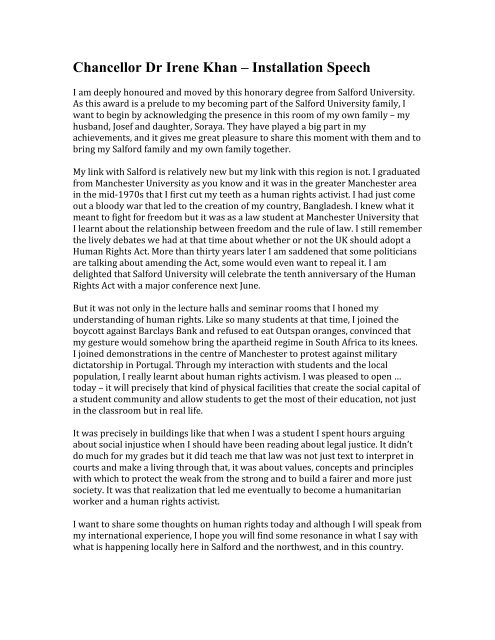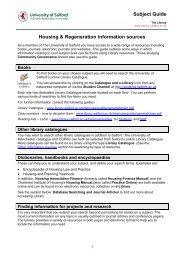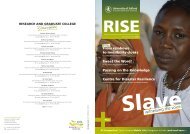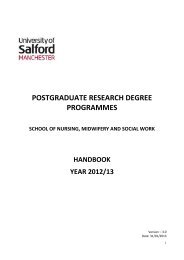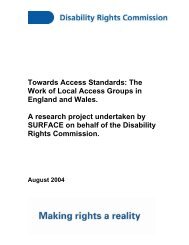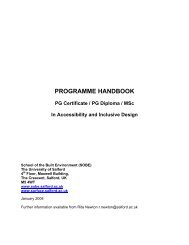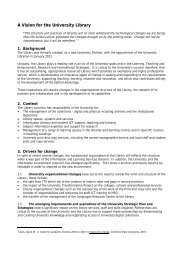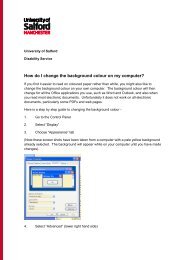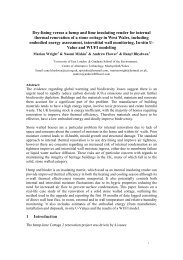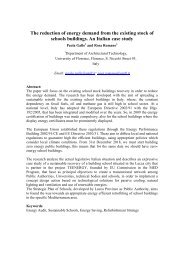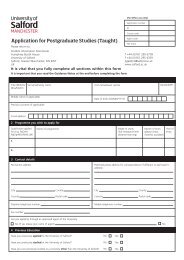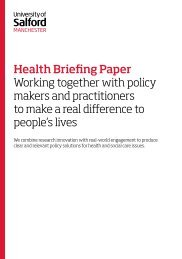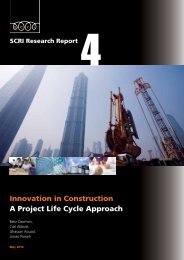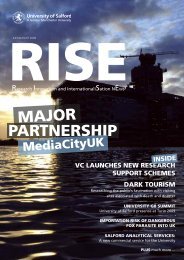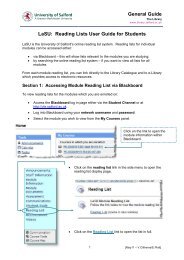Chancellor Dr Irene Khan â Installation Speech - University of Salford
Chancellor Dr Irene Khan â Installation Speech - University of Salford
Chancellor Dr Irene Khan â Installation Speech - University of Salford
- No tags were found...
You also want an ePaper? Increase the reach of your titles
YUMPU automatically turns print PDFs into web optimized ePapers that Google loves.
<strong>Chancellor</strong> <strong>Dr</strong> <strong>Irene</strong> <strong>Khan</strong> – <strong>Installation</strong> <strong>Speech</strong>I am deeply honoured and moved by this honorary degree from <strong>Salford</strong> <strong>University</strong>. As this award is a prelude to my becoming part <strong>of</strong> the <strong>Salford</strong> <strong>University</strong> family, I want to begin by acknowledging the presence in this room <strong>of</strong> my own family – my husband, Josef and daughter, Soraya. They have played a big part in my achievements, and it gives me great pleasure to share this moment with them and to bring my <strong>Salford</strong> family and my own family together. My link with <strong>Salford</strong> is relatively new but my link with this region is not. I graduated from Manchester <strong>University</strong> as you know and it was in the greater Manchester area in the mid-‐1970s that I first cut my teeth as a human rights activist. I had just come out a bloody war that led to the creation <strong>of</strong> my country, Bangladesh. I knew what it meant to fight for freedom but it was as a law student at Manchester <strong>University</strong> that I learnt about the relationship between freedom and the rule <strong>of</strong> law. I still remember the lively debates we had at that time about whether or not the UK should adopt a Human Rights Act. More than thirty years later I am saddened that some politicians are talking about amending the Act, some would even want to repeal it. I am delighted that <strong>Salford</strong> <strong>University</strong> will celebrate the tenth anniversary <strong>of</strong> the Human Rights Act with a major conference next June. But it was not only in the lecture halls and seminar rooms that I honed my understanding <strong>of</strong> human rights. Like so many students at that time, I joined the boycott against Barclays Bank and refused to eat Outspan oranges, convinced that my gesture would somehow bring the apartheid regime in South Africa to its knees. I joined demonstrations in the centre <strong>of</strong> Manchester to protest against military dictatorship in Portugal. Through my interaction with students and the local population, I really learnt about human rights activism. I was pleased to open … today – it will precisely that kind <strong>of</strong> physical facilities that create the social capital <strong>of</strong> a student community and allow students to get the most <strong>of</strong> their education, not just in the classroom but in real life. It was precisely in buildings like that when I was a student I spent hours arguing about social injustice when I should have been reading about legal justice. It didn’t do much for my grades but it did teach me that law was not just text to interpret in courts and make a living through that, it was about values, concepts and principles with which to protect the weak from the strong and to build a fairer and more just society. It was that realization that led me eventually to become a humanitarian worker and a human rights activist. I want to share some thoughts on human rights today and although I will speak from my international experience, I hope you will find some resonance in what I say with what is happening locally here in <strong>Salford</strong> and the northwest, and in this country.
Two dominant trends are casting long shadows on the human rights landscape: insecurity and inequality. We are living in a world that is not only made dangerous by violence, but also deeply divided by poverty, inequality, and marginalization <strong>of</strong> large groups <strong>of</strong> people. On the one hand the threat <strong>of</strong> terrorism has raised the fear factor to such an extent that even we who live in democratic societies are too ready to give up some <strong>of</strong> our liberty in the false hope that it will help us gain more security. On the other hand, patterns <strong>of</strong> economic growth has made the world a fundamentally insecure place – both because too many people are being excluded from the benefits <strong>of</strong> growth or even deliberately impoverished to sustain the wealth and privilege <strong>of</strong> others, and because the patterns <strong>of</strong> growth are unsustainable and threatening the very existence <strong>of</strong> our planet. Security Eleanor Roosevelt, the key architect <strong>of</strong> the Universal Declaration <strong>of</strong> Human Rights, once said: “where … do universal human rights begin? In small places, close to home -‐-‐ so close and so small that they cannot be seen on any maps <strong>of</strong> the world. Such are the places where every man, woman, and child seeks equal justice, equal opportunity, equal dignity without discrimination. Unless these rights have meaning there, they have little meaning anywhere.” Working for the UN High Commissioner for Refugees and then for Amnesty International I have had the privilege to travel many such small places. The time today is too short to tell you about the child I met in a hospital in Burundi who was the sole survivor <strong>of</strong> an ethnic massacre in her village – she could not remember her family name but she could describe to me how she watched her mother, father and baby brother being bayoneted to death and when I asked the President the next day what he would do to stop such massacres he replied – “Madam you do not understand – the army is fighting to preserve national security”. Or the old woman I met in Darfur, who told me how her village was attacked, how all the men were killed so that there were none left to bury the dead and she and the other women had to bury the dead. Or about the sixteen year old girl in the women’s prison in Kabul who told me she was abducted and raped and when she ran away from her oppressor the police put her in prison to keep her safe from her own family who would kill her because she has destroyed their honour. I do not know what has happened to that child, or that girl or that woman – what I do know, sadly, is that there are far too many people like them today that the world is failing. Governments torture people and lock them up without charge and trial, and say that they are fighting terrorism to make the world a more secure place. Meantime, the real sources <strong>of</strong> insecurity go unaddressed: whether it be the arms trade that feed conflicts, corruption, police brutality, gun violence, discrimination, gender violence, poverty, inequality, environmental degradation and climate change.
Around the world the security <strong>of</strong> the state is trumping the security <strong>of</strong> people and the security <strong>of</strong> the planet. With the Bush Administration’s war on terror policies now discredited and President’s Obama decision to close Guantanamo, an important page has been turned but the chapter is far from coming to an end. And I say that not only because there has still been no true accountability for what went wrong and what wrongs were committed in the name <strong>of</strong> counter-‐terrorism in the US or in many European countries. But also because the erosion <strong>of</strong> civil liberties in the name <strong>of</strong> counter-‐terrorism still persists with impunity in many parts <strong>of</strong> the world. Governments have a duty to protect people from such attacks. But they must do so within the framework <strong>of</strong> human rights and the rule <strong>of</strong> law. Security and human rights are not two conflicting sets <strong>of</strong> obligations, one to be traded against the other. They are complementary and inter-‐dependent. Compromising human rights does not serve the struggle against terrorism. On the contrary it plays into the hands <strong>of</strong> terrorists by destroying the values <strong>of</strong> open, democratic societies. Human rights are for the best <strong>of</strong> us and the worst <strong>of</strong> us, the guilty as well as the innocent. If we are not willing to protect the rights <strong>of</strong> those we believe to be guilty, we weaken our ability to protect those who are innocent. That applies not just to counter-‐terrorism strategies but also to the debate on criminal justice in this country when politicians and media seem too ready to sacrifice legal and judicial safeguards in the name <strong>of</strong> public security. Discrimination Compromising human rights is dangerous for many different reasons, not least because it feeds mistrust and suspicion between communities which in turn undermines multiculturalism and tolerance for diversity. For instance, discrimination and racial pr<strong>of</strong>iling have become an accepted element <strong>of</strong> anti-‐terrorism strategies in many countries. According to the British Transport Police statistics, an Asian male is five times more likely to be stopped and searched than a white man. That can only alienate minority communities. When your security is at the expense <strong>of</strong> my liberty, how can you expect me to feel that we have a common stake in our society? Or take the way in which the hijab and the niqab are being blown out <strong>of</strong> all proportions in public policy and public debate. Most Western governments are ready to turn a blind eye to attacks on women’s human rights in Islamic countries in the interests <strong>of</strong> foreign policy or economic interests. In too many countries, laws, policies and practices discriminate against women. In too many societies, social roles reinforce the power <strong>of</strong> men over women’s lives and their bodies. Too <strong>of</strong>ten, religious practices, tradition and custom tolerate and sometimes even encourage violence against women. Few perpetrators are brought to justice and even fewer convicted. Rape has the lowest conviction rate among serious crimes: worldwide it is only about 10%. That should be <strong>of</strong> great concern to both Muslims and non-‐
Muslims in this country and around the world. Yet, what do we hear most about: the banning <strong>of</strong> headscarves! Let’s get things into perspective. It is wrong for women in Saudi Arabia or Iran to be forced to put on the veil. It is equally wrong in Turkey or France for women to be forced not to the wear the headscarf. Women have the right to freedom <strong>of</strong> expression, and that includes what they choose to wear. Governments have a duty to create a safe environment in which every woman can make that choice without fear <strong>of</strong> violence or coercion. Religious and political leaders should respect the choice that women make and ensure that the choices <strong>of</strong> women are respected. Headscarves and veils are a red herring when it comes to discussing social integration. Let’s look at social and economic policies that leave minorities lagging behind in employment, housing and education, poorly integrated, and stigmatized and targeted by ill thought security strategies. That’s what is leading many Muslims, particularly young men, to turn inwards. Their alienation and anger in turn is reinforcing the fear and prejudice <strong>of</strong> some elements <strong>of</strong> the host community. Each becomes less tolerant and more hostile to the other. Increasing polarization strengthens the hands <strong>of</strong> extremists at both ends <strong>of</strong> the spectrum, reducing the space for tolerance and dissent as hardliners take over from both ends <strong>of</strong> the spectrum. That in turn creates an environment in which incidents <strong>of</strong> Islamophobia, anti-‐Semitism, other forms <strong>of</strong> racism, racial attacks and xenophobia are increasing. Think <strong>of</strong> what is happening here in greater Manchester and the demos <strong>of</strong> last weekend. One cannot speak <strong>of</strong> alienation in this part <strong>of</strong> the country without recognizing also the exclusion <strong>of</strong> those who are <strong>of</strong>ten referred to as the white working class. It is easy to translate it into an issue race but the reality is far more complex and related more to economic and social changes that have marginalized them, entrenched their poverty and sense <strong>of</strong> powerlessness. That is why I firmly believe that you cannot seriously tackle human rights problems without addressing economic and social rights along side civil and political rights. The right to education is as important as the right to read the newspaper <strong>of</strong> your choice. We need many more academics and activists to recognize the interdependence and indivisibility <strong>of</strong> human rights. Poverty and inequality Let me tell you about Rosie. Shortly after I took up my position at Amnesty International, I was in Durban and visited a police station to see how the local police handle complaints from women victims <strong>of</strong> violence. At the police station, there was a counsellor to advice women what to do. She told me the story <strong>of</strong> Rosie. Her husband would get drunk and beat her frequently – so badly that once he broke her bones – then one day he beat her so badly that she died. South Africa has one <strong>of</strong> the most progressive laws against family violence which allows a woman – through a very
simple process -‐ to get a protection order from the local court. I asked the counsellor, “Why didn’t Rosie get a protection order against her husband?” The counsellor replied, “The magistrate’s court was several miles away from where Rosie lived. She did not have money to pay for the bus fare.” To me that is a human rights problems – when the best laws in the world cannot protect a woman’s life because she is too poor to buy a bus ticket, in a world in which you and I think nothing <strong>of</strong> flying from one continent to another. Rosie died because she was poor. She did not have money – but she died also because she could not find a job, could leave her home, she had no voice, ultimately she did not count. If we listen to people living in poverty we will find that poverty is much not just about low income – it is about the denial <strong>of</strong> human rights – the right to housing, education, health but also the rights to information and participation -‐ in other words, the gamut <strong>of</strong> economic, social and cultural rights and civil, political rights. If you are poor, you are deprived <strong>of</strong> the basic necessities for a dignified life. But if you are poor, you are also powerless – you do not have the power to control your own life. If you fall ill or if you lose your job, you do not know what will happen next. In your neighbourhood, you are very likely to be at the mercy <strong>of</strong> criminal gangs. In your village in most developing countries you may be landless and so at the mercy <strong>of</strong> your land owner. You have no say in the decisions that affect your life -‐ your government could build a dam and drown what is now your village, an oil company could dig a pipeline through your land and displace you, your landlord could evict you with no notice. Because you cannot read or write you do not know how to petition your member <strong>of</strong> parliament or approach your municipality. If you and your community try to organize yourselves, you will be beaten up and thrown into prison – and you cannot afford lawyers, the judges belong to the elite classes who do not understand the language you speak and have no sympathy for your cause. Your government does not care about you; they do not give you the information you need; they do not listen to you. The police see you as a threat and attack you when they should be protecting you. You cannot afford the bribes the petty <strong>of</strong>ficials demand, and that is why you cannot register your marriage or the birth <strong>of</strong> your baby or even prove that you own this piece <strong>of</strong> land that the landlord is falsely claiming. Ironically the Universal Declaration <strong>of</strong> Human Rights in 1948 recognized all human rights, CPR as well as ECSR equally – the ideological divisions came much later. It is time those false divisions in human rights were discarded. Or we will not be able to tackle some <strong>of</strong> the most pressing problems today. Or make human rights a reality in the lives <strong>of</strong> people.
I hope that <strong>Salford</strong> will take up the holistic approach to human rights – what region <strong>of</strong> the UK more than <strong>Salford</strong> could be best suited to doing that and so better understanding the real grievances that underlie poverty, discrimination, exclusion and alienation, let’s be alert to the ways in which racism and xenophobia are being fanned. Economists tell us that economic growth in recent years has done much to eradicate poverty and that is true. Many millions <strong>of</strong> people are better <strong>of</strong>f today than their parents or grand parents were. Life expectancy has risen in many countries, illiteracy rates are falling, and diseases like small pox have been eradicated. But as human rights activists we need to ask who is being left behind, who is marginalized and outside that circle <strong>of</strong> prosperity. In India – a budding global power -‐ which has launched its own unmanned space rocket – more than 50% <strong>of</strong> children living in rural areas are underweight because they do not have enough to eat. And what is worse still is that the proportion has remained unchanged since 1992 when India began its trajectory <strong>of</strong> growth. But coming closer to home, in greater Manchester, in an arc <strong>of</strong> only ten miles or so from the south to the north, the life span falls by several years, I am told! Conclusion In the three decades since I was a law student, I have learnt that justice is not just about legal text but about values and principles, it is about the lived experience <strong>of</strong> people. Human rights are not about treaties but about right and wrong. Torture is wrong not only because it violates international law but because t is the ultimate corruption <strong>of</strong> humanity. Poverty is wrong because it disempowers and denies people control over their destiny. I am an activist. To an activist, commentary from the sidelines is not enough. When we see threats, we must tackle them. When we see wrongs, we must right them. Academics give depth and meaning to our action. Together I hope scholarship and action can make a difference to the world. I hope too that under the leadership <strong>of</strong> the incoming Vice <strong>Chancellor</strong>, Pr<strong>of</strong> Martin Hall, whose experience <strong>of</strong> South Africa gives him a real understanding <strong>of</strong> human rights, <strong>Salford</strong> <strong>University</strong> will engage with the realities <strong>of</strong> deprivation, discrimination and alienation, on its own door step. I hope the university will engage with those issues, debate them and confront them – in curricula, in its policies and practices. In January this year I was in Bangladesh, my own country, with an AI delegation. We visited a legal literacy project on human rights in a village in northern Bangladesh. As you can see in this photo, it is nothing more than a group <strong>of</strong> women sitting on bamboo mats in the dusty village enclosure. The class we visited were learning about the law prohibiting child marriage and requiring the informed consent <strong>of</strong> a woman to marriage. These women had given loans through a micro-‐credit scheme
operated by the Bangladesh Rural Advancement Committee, a large NGO. One woman told us she had used the money to buy and hopes to make some extra income by selling milk. Another woman planned to buy a sewing machine and set up a small tailoring business for herself. “Why are you here?” I asked her. “What do you hope to get out <strong>of</strong> this class?” “I want to know more about my rights,” she said. “I don’t want my daughters to suffer the way I have, and so I need to learn how to protect my rights and theirs.” The power <strong>of</strong> knowledge gives hope – and that is true <strong>of</strong> village woman in Bangladesh as the community at <strong>Salford</strong> <strong>University</strong>.


